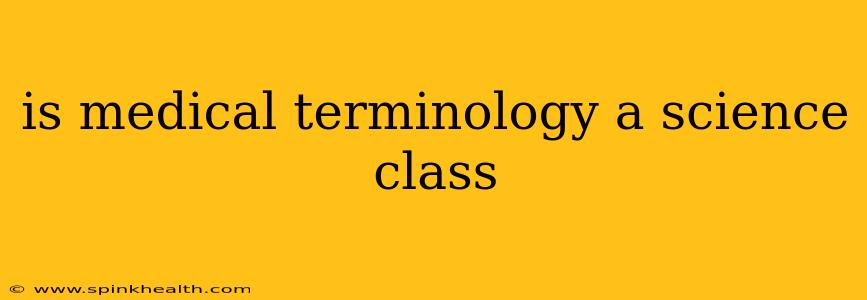Is Medical Terminology a Science Class? Unraveling the Mystery of Medical Language
The question, "Is medical terminology a science class?" isn't a simple yes or no. It's more nuanced than that. Think of it like this: medical terminology is a vital tool used extensively within the sciences of medicine and healthcare, but it's not inherently a science class itself. It's akin to learning a specialized language—a language crucial for understanding the scientific concepts within the medical field.
Let's delve deeper into this fascinating subject and explore some frequently asked questions:
Is medical terminology considered a science?
No, medical terminology isn't a science in the same way biology, chemistry, or physics are. Science involves the systematic study of the structure and behavior of the physical and natural world through observation and experiment. Medical terminology, on the other hand, is a system of prefixes, suffixes, root words, and combining forms used to build and understand medical terms. It's a language used to communicate effectively within the medical sciences.
What kind of class is medical terminology?
Medical terminology is typically categorized as a health science support class. It provides the foundational vocabulary needed to succeed in various healthcare professions. Think of it as a critical building block, similar to learning grammar before writing a novel. You can't write complex medical reports or effectively communicate with doctors and nurses without a strong grasp of medical terminology.
Is medical terminology hard to learn?
Many find medical terminology challenging initially, but its complexity is often overstated. The key lies in understanding the building blocks: prefixes, suffixes, and root words. Once you grasp the fundamental components and their meanings, you'll be amazed how quickly you can decipher even the most complex medical terms. Consistent practice and memorization are key to success.
What are the benefits of taking a medical terminology class?
The benefits are numerous, particularly for those pursuing careers in healthcare:
- Improved Communication: Clearly understanding and using precise medical terms enhances communication with patients, doctors, nurses, and other healthcare professionals. This is critical for patient safety and efficient care.
- Enhanced Comprehension: A solid grasp of medical terminology allows for better understanding of medical charts, reports, and other healthcare documentation.
- Career Advancement: In many healthcare fields, medical terminology is a prerequisite or a significant advantage for employment.
- Increased Confidence: Mastering medical terminology boosts confidence and competence in navigating the medical world.
What subjects are related to medical terminology?
Medical terminology is closely related to several other subjects, often taught concurrently or as prerequisites:
- Anatomy: The study of the body's structure.
- Physiology: The study of the body's functions.
- Medical coding and billing: Understanding medical terminology is essential for accurate coding and billing procedures.
- Healthcare Administration: Effective communication using medical terminology is crucial in administrative roles within healthcare settings.
In conclusion, while medical terminology isn't a science class in the traditional sense, it's an undeniably crucial element within the broader landscape of medical sciences. It's the language of medicine, providing the key to unlocking a deeper understanding of the human body, its functions, and the intricacies of healthcare. Mastering this language is a significant step toward a successful career in any healthcare-related field.

